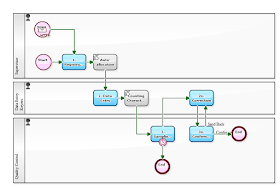Although it sounds very justifiable, sometimes there could be a "Sense of Unfairness".
- Same wage even if has underwritten a lot of work?
- Don't monopolize the jobs just because of percentage pay!
Indeed, there could be dissatisfaction either fixed wage or percentage pay. "Get the job done quickly for the customer" is not always justice in the world. That is, there are jobs that "should be shared evenly.
The following Business Process diagram represents so-called "Data Entry". The notable point is that the jobs are allocated in "taking turns".
It is applicable for
- Making received slips into text file
- Aggregation of questionnaire in paper
- Aggregation of application postcard
- Voice to Text transcription
- Making the past Document into text file
Incidentally, if you operate this business processes in a Workflow system on the Internet, it will become a good "telework support system". Surprising enough, it is also equipped with automatic counting function of the "number of input characters" so that it can be compensated if it exceeds the assumed input quantity. The first place, because the flow itself is simple, it is also easy to extend the idea according to each industry business category. It seems likely to be able to play a role in policy promotion of the Japanese government, such as 'Teleworking" and "Regional revitalization".
[Data Entry flow]
The scheme of this Business Process is that "handlers" will be selected from the "candidate list".
In this example, it begins with a state that the "candidates" are listed as [initial value] of a multi-line string. And the work supervisor will add or remove the "candidate" if necessary. (E-mail address as a User ID, Separated by line breaks)
And the allocation rule is, the same number as the remainder of division of [process serial number] by "the number of candidates"is determined as the "Handler" (person assigned actually / designated person). Those will be automatically calculated by the JavaScript engine on the server side when they arrive at [Auto-allocation] that is an automated Step.
<Script Setting screen: [Auto-allocation]>
// Remainder of 'Serial number'/'Number of candidates'
var input_text = data.get("5"); // Retrieving 'Candidate list' data item
var textObj = new String(input_text);
var arrayOfStrings = textObj.split(/\r\n|\r|\n/); // Separate by line break, store in array
var seqNum = processInstance.getProcessInstanceSequenceNumber(); // [Process sequence number]
var allocationNum = seqNum % arrayOfStrings.length; // Remainder calculation operator "%"
// Specifies the User from "User address of the remainder number"
var quser = quserDao.findByEmail( arrayOfStrings[allocationNum]) );
retVal.put("6", quser);In addition, at the auto-step of [Counting characters] after that, the number of characters of the input data are automatically counted. This will be also automatically set by the JavaScript engine on the server side.
<Script Setting screen:[Counting characters]>
// Set 'Number of characters'
var input_text = data.get("8"); // Retrieving 'Text'data item
var textObj = new String(input_text);
retVal.put("9", java.math.BigDecimal(textObj.length) );* By the way, there is a real time counter also on the inputting screen, using 'jQuery' which is a browser JavaScript framework.
The detailed Scripts as in this example (which leaving nothing unattended), will make the business smoothly. (without Planning a new Business Process, business improvement progresses in a small Action)
However, on the other hand, some programming knowledge is required for its maintenance. It must be utilized within a range to suit the literacy and policies of the organization. Do not make the "Excel studded with craftsmen function".
[Data Entry flow:'2. Data Entry' screen]
[Data items List]
[Free Download]
- Business Template: Data Entry flow
<Similar Models>
- Meaning of Automatic Starting of a 'Data Entry Flow', Triggered by Document Scanning (2014-08-11)
- Workflow to Automatically Compare the Result of Dual Inputs on One (2012-12-25)
- Remote Work, 'Hours Worked Management' is Important than You Think (2014-09-22)
- M230 AUTOMATED STEP: Auto Executing Complicated Data Processing (ECMAScript)
- M213 OPERATING SCREEN: Guidance Shown on Operating Screen (HTML/JavaScript)
- M207 DATA ITEM: Initial Value of Data Items Set at the Start
- M223 AUTO EVENT: Sleeping in the Middle
[Japanese Entry (和文記事)]




